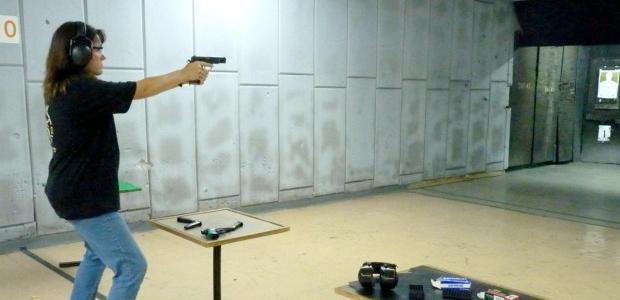Israeli bank shooting prompts discussion of tighter gun limits
An Israeli woman practices shooting at a Jerusalem firing range. Most gun ownership is outlawed in Israel. (Photo by Matthew Bell.)
Gun laws in the state of Israel are pretty strict.
Relatively few private citizens have permission to own firearms and there are tight limits on how much ammunition they can possess at one time.
But a mass shooting at an Israeli bank last week might end up leading the Israeli government to tighten restrictions even further.
It was the kind of thing that just does not happen in Israel. A disgruntled customer walked into a bank in the southern city of Beersheba last week. He took out a handgun and opened fire, killing four people and injuring three. Then he shot and killed himself.
The gunman was a former border police officer and security guard. He had a gun permit, but, according to an Israeli TV report, the shooter had not worked as a security guard for a decade.
Officials at Israel’s Ministry for Public Security say it’s time to re-examine the country’s gun laws.
“We don’t believe in a culture of firearms, or a culture of weapons,” said Moshe Dayan, who works on the licensing of firearms at the ministry.
Dayan pointed out that Israel has no second amendment giving citizens the right to own guns. Firearms are mostly reserved for the police, the army and other security agencies, Dayan said. And in certain special circumstances, members of the Israeli public are given government permission to own a gun – in most cases that means a handgun — for instance, if they live in a settlement in the West Bank.
“We believe that sometimes it’s needed,” Dayan said. “Where it’s needed, it should be rather carefully checked — as carefully as possible.”
Dayan’s boss, Minister of Public Security Yitzhak Aharonovitch, has said big changes are needed. In a statement following the bank shooting incident, he said “limiting gun ownership is at the top of our agenda and I intend to hold a weekly follow-up meeting on the subject.”
It’s difficult to imagine that kind of statement coming out of an American official’s mouth. But the reaction from some Israeli gun owners would sound familiar.
At a basement firing range in an industrial section of Jerusalem, a shooting instructor who gave his name as Dov said Israeli authorities are about to make a big mistake.
“Of course, I’m worried about new gun restrictions,” he said.
Dov said he owns five handguns, which is rare in Israel. If the proposed reforms pass, he might have to give up most of them, or at least leave them locked up in a safe at work. He went on to make an argument against gun control commonly heard in the U.S.
“The government is going to end up taking guns away from law-abiding citizens and leaving them in the hands of criminals and terrorists,” he said.
For the sake of comparison, roughly a third of American households are thought to have a gun at home. In Israel, around two percent of the population legally owns a firearm. Ronen Rabani, the owner of the Jerusalem firing range, said that Israel’s security depends on the members of that tiny gun-owning minority.
“They are not bad people,” Rabani said. “They are the best people.” And they double the strength of the police forces, he said.
But Dayan doesn’t buy that argument. Dayan said incidents of Israeli citizens pulling out their weapons to stop a criminal or terrorist has probably done more harm than good.
“This is why our policy is always looking for the balancing between the need and the dangers,” he said.
Unlike in the U.S., there is always an armed guard on duty at Israeli schools. But one proposed change to Israeli gun regulations would require security guards to leave their weapons locked up at work, rather than carry them to and from home.
One security guard at a school in Jerusalem — who didn’t want to give his name — said the change would not make much difference to him. Sure, there is terrorism and crime in Israel, he said.
“But not everywhere, not every second, not every minute,” he added. And besides, “God is with me all the time, so I’m not worried about it. What should I worry about?”
Of course, he said he needs a gun while on duty at the school. But frankly, he added, “the gun is heavy, it’s uncomfortable to carry, and I would just as soon make the daily commute without it.”
